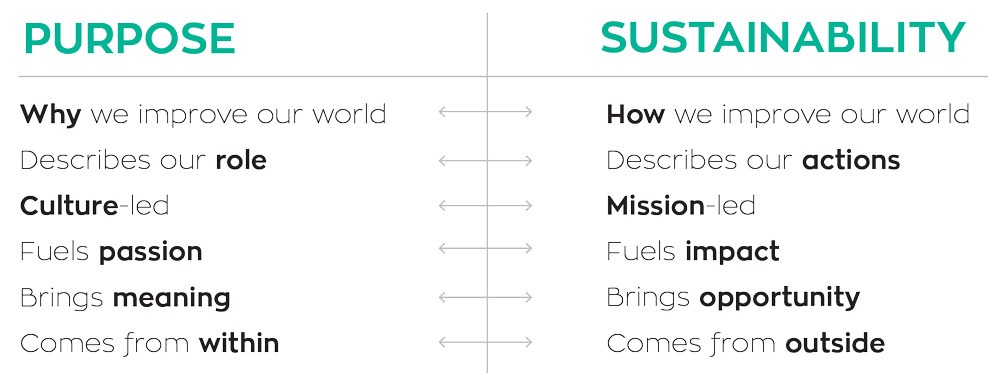While there is wide acceptance that a purposeful business is a good thing, there is plenty of confusion around what “purpose” is and what it is not.
For me, after years of working on pitch meetings in advertising firms, the idea of purpose had me jaded. We were constantly huddled up in an agency conference room ideating on Client X’s “purpose campaign” trying to appeal to millennials who support “purpose-driven brands” and “vote with their wallets.” I kept thinking we shouldn’t be the ones inventing a company’s purpose out of thin air. This doesn’t feel right. And it didn’t feel right because it wasn’t authentic.
What I inherently knew then but couldn’t articulate was that you can’t invent a company’s purpose. It is something that has to come from within.
What excites me about purpose today is its ability to instill confidence in people and unlock potential. When leaders have more confidence in the organization’s purpose, and empower the people around them to lead in ways that support it, work becomes more fun and new opportunities can flourish.
Purpose is….
Purpose is the reason your business exists — strategically guiding everything about the vision of the company you love. It is the role your business plays in solving a problem or creating impact. This reason for being usually comes from the founder’s realization and passion for solving a problem in a new way.
Purpose is a constant. It does not change to address the needs of stakeholders. It is an intention that everyone at the company (ideally) serves. A well articulated and embedded purpose gives your company focus and inspires customers, employees, and investors with what your company stands for.
Purpose is not…
Purpose is not a tagline, and it should not be the domain of the marketing department. It is frequently hijacked for campaigns as an attempt to sell a product or positioning as a lifestyle brand.
Where purpose gets lost (or where people can sometimes get lost in it) is thinking about it too broadly. Your company’s purpose is not to “make the world a better place.” Your business exists to solve a specific issue for people, and in doing so, you will make an impact on their lives. When purpose is not grounded in the product or service we offer to the world, and does not clearly link to the role we can play in the problem we want to solve, we are at risk of overpromising.
Panasonic’s “A Better Life, a Better World” is an example of a brand equity campaign masquerading as purpose. An electronics company pivoting from televisions to using its tech to power electronic cars and low-carbon home-heating products is a smart business decision. Claiming to deliver a better world through 75-inch Ultra HD LED TV’s is a stretch.
Purpose is not your mission statement
A mission statement describes what an organization wants to achieve in a space of time and for whom. It is about what you do, not why you do it. A company’s mission is meant to be achieved — and once you have, it is time to create a new one.
Your company’s purpose does not change — it endures. And if you find yourself changing to appease investors or customers, consider it a red flag!
Purpose is not your sustainability strategy
Purpose is about focusing on what you really stand for. Corporate social responsibility (CSR) and sustainability are actions you take based on what is material to the long-term success of the business. These strategies are informed by speaking with internal and external stakeholders, and the most critical issues naturally change over time.
When used right, purpose and sustainability make a powerful team. Purpose gives sustainability the meaning and passion it needs to engage people. Sustainability gives purpose action and evidence. And ultimately while a purpose may not be inherently sustainable, the way it’s lived should be. If not, it’s not enduring, and it won’t serve you for long.

You don’t need a new “social purpose”
Brands have started to seek a “social purpose” in an effort to show they care for society, similar to having a CSR strategy that gives back to others.
Every company that is living its purpose already has a social purpose — because a company’s purpose centers on the impact it seeks to have on peoples’ lives.
I find this concept easier to grasp when looking at a real example. Amy’s Kitchen is a pioneer of the organic food movement. It started out as a small family-run business and now sells over 250 varieties of vegetarian prepared meals at retailers nationwide. Amy’s purpose is to “make it easy and enjoyable for everyone to eat well.” For the founders, eating well is critical to what they stand for. By providing vegetarian, organic, sustainably-sourced meal options that are delicious, affordable, and convenient, Amy’s is fulfilling its purpose — while achieving a social good.
Your company’s purpose is the constant, guiding force that drives your business, your culture, and the people who choose to work with you every day. Whether you’re starting a new business, or a leader wanting a North Star to grow an established brand, knowing what purpose is for will help set your purpose journey up for success.






